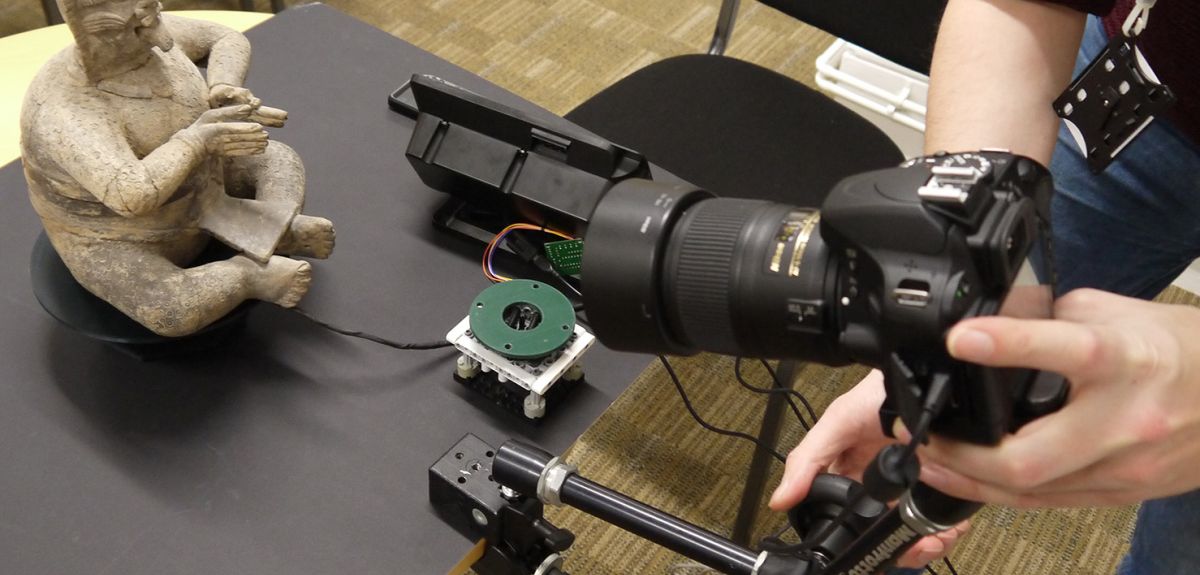
Image credit: PalaeoPi
Oxford company PalaeoPi launches to offer automated 3D digitisation of objects
PalaeoPi, a spinout company from the University of Oxford, is driving down the costs of high-throughput, high-resolution, close-range photogrammetry through research and automation, bringing photo to 3D to all.
PalaeoPi is looking to differentiate itself from its competitors with its integrated photogrammetry product, the MKIII TablePi. Working up from a previous model made from Lego and 3D printed parts, the new TablePi is capable of digitising small to medium-sized objects rapidly and accurately, taking over 200 high-resolution photos in five minutes using three separate digital SLR cameras.
The company is initially targeting archaeological science with its integrated photogrammetry product, allowing researchers the ability to quickly and effectively turn objects into digital 3D models. Although its current focus is the heritage and university sectors, PalaeoPi plans to expand its client base as it grows, offering its high-quality, research-grade and low-cost 3D digitisation to other sectors. Specifically, PalaeoPi plans to support game and virtual reality developers, CGI designers, and related animation fields. PalaeoPi is also offering consultancy services to its clients, including photogrammetry training, trouble shooting, method development, and proof of concept prototyping, a service which has already helped researchers develop a low-cost solution for reflectance transformation imaging (RTI).
PalaeoPi’s underlying technology was developed by Richard Benjamin Allen, Research Support Officer at the Oxford University School of Archaeology and Lab Manager of the Henry Wellcome PalaeoBARN, and Dr Ardern Hulme-Beaman, a Leverhulme Trust Early Career Fellow in the Department of Archaeology, Classics and Egyptology at the University of Liverpool. The spinout is the first company developed as a lean spinout by Oxford University Innovation, the innovation arm of the University. The lean spinout model aims to support ideas which don’t require upfront investment or long-term support in order to bring their product to market.
Richard Benjamin Allen, founder of PalaeoPi, said: 'I set up PalaeoPi to offer a different paradigm. PalaeoPi is helping institutions and companies to develop and maintain their own expertise in photogrammetry. We are doing this through customer-led R&D, publication of research with University partners, and long-term support of an automated platform that is easy to customise, easy to repair, easy to retrofit, and modular with backwards compatibility in mind. We are equipping people with the tools and knowledge they need to make good choices in their research and beyond.'
Dr Philippa Christoforou, Licensing and Ventures Manager at Oxford University Innovation, added: 'Innovations based on research happen across the University of Oxford, but like most business, they don’t need a portfolio of patents and 6-figure investment to get going; what they need is support in building a strong, sustainable business model to maximise the innovation’s impact – it can all be done for the price of filing a patent. Richard’s solutions for photogrammetry are neat products coupled with a strong pipeline and the potential for strong growth in multiple markets; it’s been a pleasure to help.'
 Expert Comment: Why has Trump launched so many tariffs and will it cause a recession?
Expert Comment: Why has Trump launched so many tariffs and will it cause a recession?
 Expert Comment: Is it possible to support both AI innovation and human creativity?
Expert Comment: Is it possible to support both AI innovation and human creativity?
 Oxford unmasks the fraudsters behind the forgeries for April Fakes Day 2025
Oxford unmasks the fraudsters behind the forgeries for April Fakes Day 2025